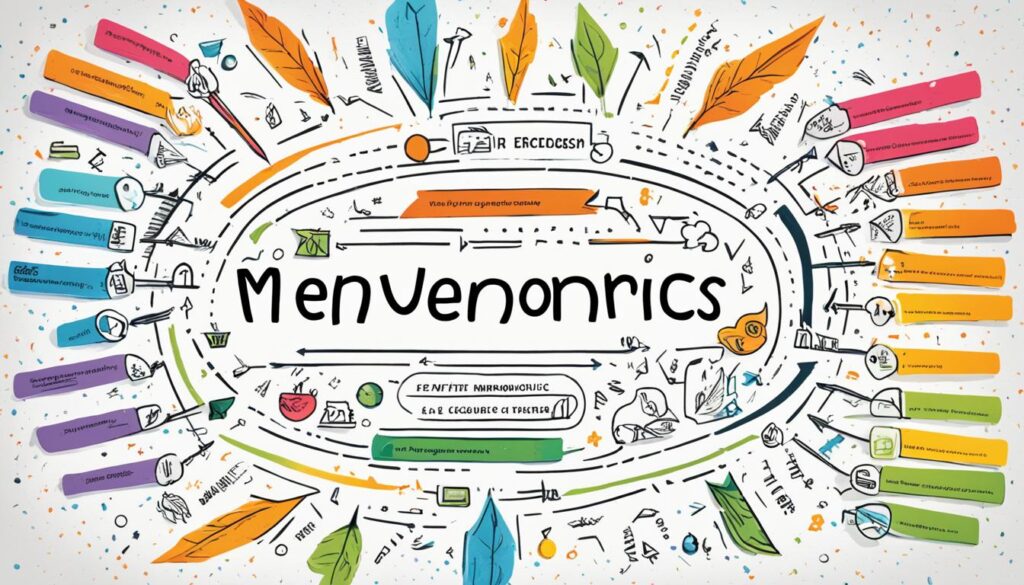Have you ever struggled to recall content you read just days earlier? In today’s hurried culture, the ability to comprehend text and retain information is vital for personal advancement. These skills prove crucial for academic, professional, or personal endeavors, enriching our lives.
Contrary to common belief, memory techniques are not the exclusive domain of those with innate prodigious memory. Methods such as the Memory Palace, spaced repetition, chunking, and acronyms are invaluable for all. By continuously employing these tools, one can fortify their memory, applicable universally.
Key Takeaways
- Memory techniques are accessible to everyone, not just memory champions.
- Mnemonics, such as the Memory Palace technique, are especially effective.
- Enhancing reading comprehension can significantly influence personal growth and self-development.
- Consistent practice of these methods can improve long-term memory retention.
- These skills are versatile and useful across a multitude of disciplines.
The Importance of Memory Techniques in 2024
In ongoing digital evolution, mastering memory techniques stands paramount to tackle information overload and thorny digital amnesia. The prolific inflow of online content, spanning from frequent social media usage to the consumption of copious online articles, has an adverse effect. It can overwhelm the human brain, causing crucial knowledge to be disregarded.
Embracing memory techniques, such as mnemonic devices for reading comprehension, provides viable solutions against the forgetting curve, a phenomenon where most learned information rapidly diminishes. Not confined to simple fact retention, these methods serve as fundamental tools for profound intellectual growth and heightened productivity.
Incorporating memory techniques for learning yields substantial benefits for self-improvement and holistic personal development. These methods empower individuals to enhance their information retention abilities, thus better managing and absorbing the inundation of data received on a daily basis. Instilling these techniques into daily practices significantly fortifies cognitive prowess and fosters personal enhancement.
Understanding How Memory Works
The brain’s memory systems are similar to a sophisticated data management system. By comprehending the intricacies of memory, strategies to enhance retention and recall skills can be cultivated. This understanding is pivotal for cognitive development.
Short-Term Memory vs. Long-Term Memory
Short-term memory, comparable to a computer’s RAM, briefly stores information for immediate use, typically within a 48-hour span. Contrastingly, long-term memory operates akin to a computer’s hard drive, allowing for the retention of essential information accumulated throughout a lifetime. This differentiation is crucial for optimizing memory retention.
The Role of Sleep in Memory Retention
Sleep plays an essential role in memory consolidation. During the restorative phase, the brain transfers data from short-term to long-term memory, enhancing recall by prioritizing critical information. A consistent sleep schedule is imperative to exploit this memory-enhancing effect of sleep.
Proven Mnemonic Devices for Better Memory
Mnemonics empower individuals to enrich their reading comprehension. They act as efficient vehicles for encoding and recalling data. Below, I detail several well-established mnemonic methodologies for improving understanding:
- Memory Palaces: An association method linking information with familiar environmental locales. Mentally navigating a known space facilitates detail recall.
- Spaced Repetition: Utilizes timed reviews to prevent knowledge decay. Regular refreshers facilitate long-term memory retention, notably elevating comprehension.
- Chunking Information: Division of extensive data into easily retained segments. This technique, akin to organizing a phone number, enhances assimilation and recall.
- Expression Mnemonics or Acronyms: Simplifies content by converting it into catchy phrases or abbreviations. For example, “HOMES” stands for the Great Lakes, making memorization straightforward.
- The Major System: Converts numbers into consonant sounds destined for vivid word creation. It serves as a powerful numerical memory enhancer, forging lasting connections.
- The NAME Acronym: Specifically designed for person and fact recollection. Setting up sensory cues based on the N-A-M-E structure embeds information more effectively in memory.
Individually or together, these mnemonic tools profoundly augment the assimilation and remembrance of textual content. Implementing these strategies regularly can revolutionize your learning process and retention ability.
Effective Reading Strategies to Improve Memory Retention
In our swiftly advancing world, the goal to recall 2024’s academic insight has amplified. Utilizing effective reading schemes is pivotal. It markedly increases one’s capacity to memorize and retrieve knowledge.
Focused Reading Techniques
Undoubtedly, focused reading stands as a cornerstone strategy. It requires the elimination of external stimuli, allowing a deep dive into the text. By employing techniques like text annotation, the formation of vivid mental schemas, and full engagement, one can experience a significant leap in retention abilities. This involvement compels the brain to actively process the input, fostering a more comprehensive understanding.
Using Physical Books vs. Ebooks
The nature of the reading material, whether a traditional print or an electronic copy, also plays a vital role. Bound books offer sensory and visual cues, assisting memory retention. The process of physically turning pages and the placement of content on each page forge potent memory links. Conversely, electronic texts, often viewed in a continuous, linear pattern, lack these benefits.
Opting for printed materials and combining them with the aforementioned focused reading tactics could lead to unparalleled retention rates. Marking up text, conceptualizing through imagery, or relishing the tactile feedback of a book embeds information more deeply. Altogether, these steps enrich both memory storage and the understanding of the material.
Remember What You Read 2024: Practical Tips
Memorization of texts becomes a more manageable task through the application of effective methods. By integrating such strategies into your reading schedule, you can notably enhance your capacity to preserve the learned material.
Annotate and Highlight Key Information
Annotating and highlighting text enriches your engagement with the material. This active engagement not only increases the content’s appeal but also fosters its retention in your memory. Focusing on critical details enables easier future reference, facilitating the process of recalling essential information from 2024.
Discuss What You’ve Read with Others
Partaking in discussions regarding readings plays a pivotal role in enhancing memory. Such engagements require the articulation and examination of concepts, thereby strengthening the neural networks associated with memory. This approach aids in the retention of information while simultaneously enriching your comprehension. Through the act of discussing and elucidating ideas, concepts become firmly established in your memory, contributing to the effortless recollection of 2024’s readings.
Memory Techniques for Learning and Retention
To enhance the acquisition and retention of information, utilizing targeted memory strategies is paramount. These tactics elevate cognitive prowess and facilitate the crystallization of memory over extended durations.
Memory Palaces
The technique of Memory Palaces capitalizes on spatial memory and links novel data with familiar settings. It involves mentally constructing a well-known building or environment and depositing informational elements in distinctive areas. As one ‘travels’ through this imagined space, memory recall is significantly streamlined. Such a methodology plays a pivotal role in learning endeavors, fostering more profound retention.
Spaced Repetition
Spaced repetition stands as a formidable approach against memory decay, featuring the periodic review of material to prevent forgetting. The act of revisiting content at the brink of extinction fortifies one’s memory, constituting a cornerstone of advanced memory enhancement methodologies.
Chunking Information
The process of chunking, which involves partitioning extensive data into digestible segments, aligns with the brain’s operational preferences. It simplifies the cognitive load, enabling easier information absorption and storage. By capitalizing on the brain’s tendency to prefer data in moderate portions, this strategy markedly advances the extended retention of material.
Boost Your Recall Skills with Regular Practice
Enhancing memory involves more than occasional commitment. To truly elevate recall aptitudes, engaging in regular practice is essential. This endeavor undergirds the establishment of enduring cognitive patterns, pivotal for effective memory permanence.
Daily Memory Exercises
Partaking in memory-enhancing exercises on a daily basis proves profoundly impactful. Tasks include revisiting past lessons, exploiting flashcards, or indulging in mental games like Sudoku. These endeavors fortify synaptic connections, simplifying the timely retrieval of stored knowledge.
The Power of Consistency
The cornerstone of memory enhancement rests within unwavering consistency. Consistent engagement ensures frequent stimulation of the brain, fostering the refinement of cognitive functions. This durable commitment not only amplifies the capacity for memory storage but also streamlines the assimilation and recollection of new data incessantly.
Combining Memory Techniques for Maximum Effectiveness
To achieve maximal memory enhancement, integrating diverse techniques is pivotal. The fusion of memory methodologies yields results beyond compare. Employing mnemonic devices in conjunction with focused reading strategies ensures comprehensive information comprehension. Additionally, the utilization of spaced repetition serves to cement knowledge, preventing its escape from memory.
Daily practice acts as the cornerstone in my endeavor to boost memory. By consistently revisiting and engaging with studied content, synaptic connections are fortified. This method taps into the brain’s ability to adapt to various informational inputs and assimilation processes. Thus, a well-rounded technique substantially uplifts memory productivity.
“By integrating various memory techniques, one can achieve a deeper and more sustainable understanding of complex material.”
- Mnemonic Devices
- Focused Reading
- Spaced Repetition
- Daily Practice
When amalgamated, these aforementioned strategies offer a potent arsenal for cognitive enhancement and memory maximization. The holistic application of this approach not only sharpens cognitive faculties but also cultivates an in-depth understanding of the subject matter. The efficacy of such a system is profound and far-reaching.
Conclusion
In 2024, the endeavor to master effective memory techniques underscores their fundamental value amid a tidal wave of information. Moving beyond simple memorization, these approaches enhance our understanding and engagement with the world. Techniques like Memory Palaces and spaced repetition serve as indispensable aids in our cognitive toolkits.
Implementing mnemonic devices is only one step; optimal reading approaches are equally crucial. Choosing physical books for their use of tactile and spatial memory triggers or employing concentrated methods to boost focus and retention bolsters our memory skills. Such integrated strategies enrich our learning adventure.
Deploying a blend of these techniques, accompanied by dedication and practice, fosters substantial intellectual and personal development. Efficient content recall revolutionizes our connection with knowledge and boosts our capacity for continuous learning. Embracing these strategies moving forward equips us to confidently wade through vast informational realms.






